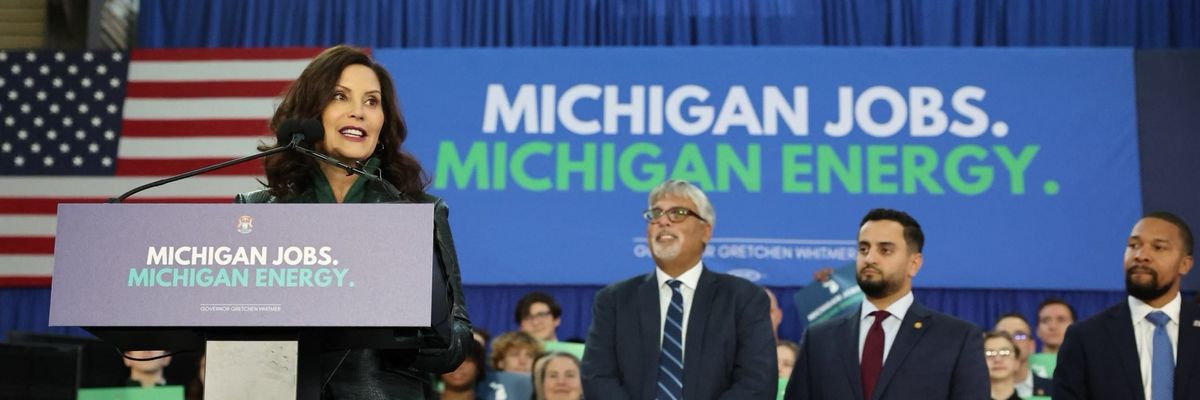As scientists worldwide continue to sound the alarm about the need to swiftly ditch planet-heating fossil fuels, Democratic Michigan Gov. Gretchen Whitmer won praise from green groups on Tuesday for signing what she called "game-changing" legislation that "will help us become a national leader in clean energy."
"These bills translate into better air, water, and health for everyone," said Derrell Slaughter, Michigan clean energy advocate at the Natural Resources Defense Council. "The pathbreaking standards for the Midwest industrial heartland will see the state move to 100% clean energy by 2040 and put more resources toward energy efficiency."
"Michigan has seized the opportunity to demonstrate our commitment to combating climate change and ensure a sustainable, just, and prosperous future for our state," he added.
Senate Bill 271 is the part of the "Clean Energy Future" package that features the 100% clean energy standard. S.B. 273 increases Michigan's energy waste reduction standards, and S.B. 277 lets farmers rent out their land for solar power generation.
Additionally, S.B. Bill 502 directs the Michigan Public Service Commission to consider affordability, equity, environmental justice, and public health in reviews of power company plans; S.B. 519 establishes a Community and Worker Economic Transition Office at the the state Department of Labor and Economic Opportunity; and House Bill 5120 empowers the MPSC to greenlight large renewable energy projects.
Johanna Neumann, senior director of Environment America's Campaign for 100% Renewable Energy, said Tuesday that "since the 1800s, Michigan has been at the forefront of leveraging new technologies to improve American lives. By committing to a future powered entirely by clean, renewable energy, Michigan is building on its legacy of innovation."
"Gov. Whitmer and the state Legislature are creating a situation ripe for Michigan to realize its vast renewable energy potential," she continued. "The state has enough wind resources to power the state 3.5 times over and enough sunshine to meet 55 times the state's 2020 electricity demand."
Neumann noted that Michigan joins other states also "leading the way" with clean or renewable energy mandates for the coming decades: California, Connecticut, Hawaii, Illinois, Maine, Minnesota, Nevada, New Mexico, New York, Oregon, Rhode Island, Virginia, and Washington.
"In 2018, when Environment America launched its 100% Renewable Campaign, only Hawaii had any statewide 100% clean or renewable energy goal," she said. "It's great to see more states ensure that powering our lives with clean and renewable energy will lead to a healthier and safer future. We'll keep driving more states to get on the 'road to 100%'"
While climate campaigners welcomed the package, there are some notable critiques. As Michigan Advanceexplained:
The Michigan Environmental Justice Coalition has expressed opposition to a key part of the package, S.B. 271, which requires energy companies to generate 60% of their energy from renewable sources by 2035 including biomass, landfill gas made from solid waste, gas from methane digesters using municipal sewage waste, food waste and animal manure, and energy-generating incinerators in operation before January 1.
The group says that the carveout for landfill gas, biomass, gas from a methane digester, and its inclusion of incinerators and natural gas using carbon capture technology will disproportionately impact lower-income communities.
"Gov. Whitmer and her allies will try to spin the passage of S.B. 271 as a victory for climate and environmental justice," said Juan Jhong-Chung, Michigan Environmental Justice Coalition co-executive director. "In reality, it is a disaster for everyone but DTE and Consumers Energy. There can be no climate win without environmental justice, and environmental justice communities who will bear the brunt of this dirty law were systematically excluded, dismissed, and ignored during its drafting."
The Detroit News reported Tuesday that "DTE Energy, one of Michigan's two dominant electric utilities, gets about 15% of its electricity generation from renewable sources, according to its website. And Consumers Energy, the other dominant electric utility, already plans to get 40% of its energy from renewable sources by 2040."
Whitmer, who celebrated signing the bills with an event at Detroit's Eastern Market, declared on social media that "today is a huge win for Michigan. We'll protect our air, water, and land while facing climate change head-on and lowering costs."
As The Detroit News detailed: "Whitmer said the measures will lower household energy costs by an average of $145 a year, but Republicans have argued rates will increase as utilities pass the costs of renewable projects along to customers. The study the governor appeared to get the $145 projection from examined additional changes on top of the new laws' move to clean energy."
Whitmer also declared that the legislation will bring nearly $8 billion in federal funding to the state for clean energy projects and create 160,000 "good-paying" jobs, according to Michigan Advance.
"With today's bills, we define the future," Whitmer said. "As Michiganders, we know we have a responsibility to face climate change head-on, not only to make lives better today, but to make sure life goes on centuries from now. Let's keep fighting for future generations."
The governor is widely seen as a rising star in the Democratic Party and is expected to potentially seek national office someday. For 2024, Whitmer has made clear that she supports President Joe Biden, who is seeking reelection.
Biden—who ran on ambitious climate pledges in 2020 but has let campaigners down with decisions on the Mountain Valley Pipeline, Willow oil project, and leases for extracting fossil fuels from public lands and waters—plans to skip the United Arab Emirates-hosted U.N. climate summit, COP28, set to begin Thursday in Dubai.

